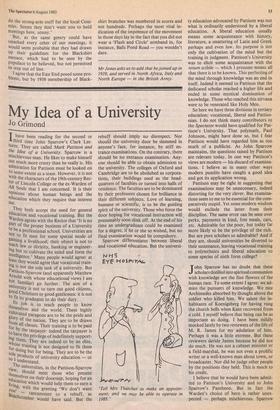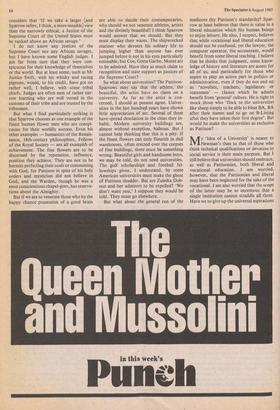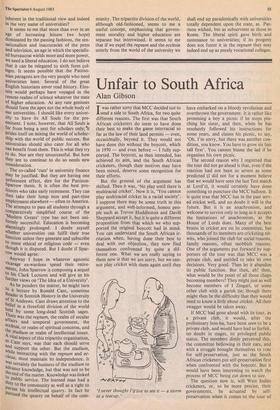My Idea of a University
Jo Grimond
Ihave been reading for the second or third time John Sparrow's Clark Lec- tures. They are called Mark Pattison and the Idea of a University. Sparrow is a mischievous man. He likes to make himself out much more crusty than he really is. His admiration for Pattison must be looked on to some extent as a tease. However, it is not with the characters of the 19th-century Rec- tor of Lincoln College or the ex-Warden of All Souls that I am concerned. It is their opinions about human beings and the education which they require that interest Inc.
They both accept the need for general education and vocational training. But the Warden agrees with the Rector that 'It is no part of the proper business of a University to be a professional school. Universities are not to fit men for some special mode of gaining a livelihood; their object is not to teach law or divinity, banking or engineer- ing but to cultivate the mind and form the intelligence.' Many people would agree: at least they would agree that vocational train- ing is not the sole task of a university. But Pattison-Sparrow (and apparently Matthew Arnold with whose educational views l am not familiar) go further. The aim of a university is not to turn out good citizens, good Christians or good gentlemen: it is not to fit its graduates to do their duty. Its job is to teach people to know themselves and the world. These highly cultivated paragons are to be the pride and glory of the nation. They are to be drawn Irom all classes. Their training is to be paid for by the taxpayer: indeed the taxpayer is to have the privilege of indefinitely support- ing them. They are indeed to be an elite, whose training is not designed to fit them for doing but for being. They are to be the sole products of university education — or so I understand. The universities, in the Pattison-Sparrow view, should meet those who present themselves on their doorstep, hoping for an education which would help them to earn a living, with the greeting 'We don't want You — tantamount to a rebuff, as Beachcomber would have said. But the
rebuff should imply no disrespect. Nor should the university door be slammed in anyone's face, for instance, by stiff en- trance examinations. On the contrary, there should be no entrance examination. Any- one should be able to obtain admission to the university. The colleges of Oxford and Cambridge are to be abolished as corpora- tions, their buildings used as the head- quarters of faculties or turned into halls of residence. The faculties are to be dominated by their professors chosen for brilliance in their different subjects. Love of learning, humane or scientific, is to be the guiding spirit of the university. Those who force the door hoping for vocational instruction will presumably soon slink off. At the end of his time an undergraduate could be examined for a degree, if he or she so wished, but no final examination would be compulsory. Sparrow differentiates between liberal and vocational education. But the universi-
'Tell Mrs Thatcher to make an appoint- ment, and we may be able to operate in 1985." ty education advocated by Pattison was not what is ordinarily understood by a liberal education. A liberal education usually means some acquaintance with history, literature, a smattering of Latin and Greek perhaps and even law. Its purpose is not only the cultivation of the mind but the training in judgment. Pattison's University was to elicit some acquaintance with the totum scibile — which I presume means all that there is to be known. This perfecting of the mind through knowledge was an end in itself. Indeed it seemed to Pattison that the dedicated scholar reached a higher life and ended in some mystical domination of knowledge. Those who reached this nirvana were to be venerated like Holy Men.
So here we have three divisions in tertiary education: vocational, liberal and Pattiso- nian. I do not think many contributors to the Spectator would have qualified for Pat- tison's University. That polymath, Paul Johnson, might have done so, but I fear Pattison would have regarded him as too much of a publicist. As John Sparrow maintains, the questions raised by Pattison are relevant today. In one way Pattison's views are modern — his discard of examina- tions. I believe as in many other ways modern pundits have caught a good idea and got its application wrong.
Pattison may be right in suggesting that examinations may be unnecessary, indeed distorting for the very clever. But examina- tions seem to me to be essential for the com- paratively stupid. Yet some modern wisdom would exclude the latter from their discipline. The same error can be seen over perks, payments in kind, free meals, cars, etc. Admirable for the poor, but today far more likely to be the privilege of the rich. But are pure scholars so admirable? And if they are, should universities be diverted to their sustenance, leaving vocational training to polytechnics and liberal education to some species of sixth form college?
John Sparrow has no doubt that these scholars distilled into spiritual communion with knowledge are the fine flowers of the human race. To some extent I agree; we ad- mire the pursuers of knowledge. We rate Archimedes absorbed by thought above the soldier who killed him. We salute the in- habitants of Koenigsberg for having rung the church bells when Kant recovered from a cold. I myself believe that being can be as important as doing. I have been mildly mocked lately by two reviewers of the life of M. R. James for my adulation of him. Perhaps it was a little extreme. But these reviewers deride James because he did not do much. He was not a cabinet minister or a field-marshal, he was not even a prolific writer or a well-known man about town, or broadcaster. Nor did he judge other people by the positions they held. This is much to his credit.
I believe that he would have been admit- ted to Pattison's University and to John Sparrow's Pantheon. But in fact the Warden's choice of hero is rather unex- pected — perhaps mischievous. Sparrow considers that 'If we take a larger [and Sparrow infers, I think, a more sensible] view than the narrowly ethical, a Justice of the Supreme Court of the United States must be ranked above an African savage.'
I do not know any justices of the Supreme Court nor any African savages, but I have known some English judges. I am far from sure that they were con- spicuous for their knowledge of themselves or the world. But at least some, such as Mr Justice Swift, with his whisky and racing pigeons, would, to his credit, have got on rather well, I believe, with some tribal chiefs. Judges are often men of rather nar- row learning who are well versed in the customs of their tribe and are trusted by the tribesmen.
But what I find particularly striking is that Sparrow chooses as one example of the finest human flower men who are conspi- cuous for their worldly success. Even his other examples — humanists of the Renais- sance, 18th-century philosophers, Fellows of the Royal Society — are all examples of achievement. The fine flowers are to be discerned by the reputation, influence, position they achieve. They are not to be hermits perfecting their souls or communing with God, for Pattison in spite of his holy orders and mysticism did not believe in God, and the Warden, though he was a most conscientious chapel-goer, has reserva- tions about the Almighty.
But if we are to venerate those who by the happy chance possession of a good brain are able to dazzle their contemporaries, why should we not venerate athletes, artists and the divinely beautiful? I think Sparrow would answer that we should. But they must display their wares. The shipwrecked mariner who devotes his solitary life to jumping higher than anyone has ever jumped before is not in his eyes particularly estimable, but Coe, Greta Garbo, Monet are to be admired. Have they as much claim to recognition and state support as justices of the Supreme Court?
So what about universities? The Pattison- Sparrows may say that the athlete, the beautiful, the artist have no claim on a university. As far as the artist is con- cerned, I should at present agree. Univer- sities in the last hundred years have shown little appreciation of art. Several of them have spread desolation in the cities they in- habit. Modern university buildings are, almost without exception, hideous. But I cannot help thinking that this is a pity. If the finest flowers can only flourish in dull warehouses, often erected over the corpses of fine buildings, there must be something wrong. Beautiful girls and handsome boys, we may be told, do not need universities. The golf scholarships and football fel- lowships given, I understand, by some American universities must make the ghost of Pattison shudder, But are Zuleika Dob- son and her admirers to be expelled? 'We don't want you,' I suppose they would be told. They must go elsewhere.
But what about the general run of the
mediocre (by Pattison's standards)? Spar- row at least believes that there is value in a liberal education which fits human beings to enjoy leisure. He also, I suspect, believes that while vocational and liberal education should not be confused, yet the lawyer, the computer operator, the accountant, would benefit from some liberal teaching. I believe that he thinks that judgment, some know- ledge of history and literature are assets for all of us, and particularly for those who aspire to play an active part in politics or administration, even if they do not end up as 'novelists, teachers, legislators or statesmen' — classes which he admits benefit from 'general' culture. He is right to mock those who 'flock to the universities like sheep simply to be able to bleat BA, BA after their names and to go on B-Litting after they have taken their first degree'. But would he make the universities as exclusive as Pattison?
My 'Idea of a University' is nearer to Newman's than to that of those who think technical qualifications or devotion to social service is their main purpose. But I still believe that universities should embrace, as well as Pattisonian, both liberal and vocational education. I am worried, however, that the Pattisonian and liberal may have been neglected for the sake of the vocational. I am also worried that the scope of the latter may be so enormous that a single institution cannot straddle all three. Have we to give up the universal aspirations
inherent in the traditional view and indeed in the very name of universities?
It seems to me that more than ever in an age of increasing leisure (we hope) dominated by the passing fashions, the sen- sationalism and inaccuracies of the press and television, an age in which the specialis- ed bureaucrat wields more and more power, we need a liberal education. I do not believe that it can be relegated to sixth form col- leges. It seems possible that the Pattiso- nian paragons are the very people who need universities least. Several of the great English historians never read history. Eins- tein would perhaps have voyaged in the remote realms of science whatever the state of higher education. At any rate geniuses should form the apex not the whole body of our universities. I should like every univer- sity to have its All Souls for the pre- eminent. I note, however, that All Souls is far from being a nest for scholars only; It Prides itself on mixing the world of scholar- ship with the world of public success. But universities should also cater for all who Can benefit from them. This is what they try to do. Nor are they unsuccessful. But how they are to continue to do so needs new Consideration.
The so-called 'cuts' in university finance may be justified. But they are having one unforeseen effect, dire for the Pattison- Sparrow thesis. It is often the best pro- fessors who take early retirement. They can then take their lump sum and part-time employment elsewhere — often to America. The attempts to pass all students through a comparatively simplified course of the Modern Greats' type has not been uni- formly successful. Education is becoming alarmingly prolonged. I doubt myself whether universities can fulfil their true function unless they generate and subscribe to some ethical or religious code — even though it is disputed. But I doubt if Spar- row would agree.
Anyway I hope in whatever agnostic vicarage ex-wardens spend their retire- ments, John Sparrow is composing a sequel to his Clark Lectures and will give us his further views on 'The Idea of a University'.
As he ponders the matter, he might turn to a lecture by Ronald Cant, sometime Reader in Scottish History in the University of St Andrews. Cant draws attention to the belief in a threefold division of the world held by some long-dead Scottish sages. there was the regnum, the realm of secular affairs and temporal government, the ecclesia, or realm of spiritual concerns, and the studium or realm of intellectual issues. A vital aspect of this tripartite organisation, as Cant says, was that each should serve and. support the other. But the studium, while interacting with the regnum and ec- clesia, must maintain its independence. It was certainly the business of the studium to advance knowledge, but that was not to be the end of the matter. Knowledge was linked 1..,0 Public service. The learned man had a duty to' the community as well as a right to Pursue his intellectual quarry. In fact he Pursued the quarry on behalf of the com- munity. The tripartite division of the world, although old-fashioned, seems to me a useful concept, emphasising that govern- ment morality and higher education are separate but intertwined. It seems to me that if we expel the regnum and the ecclesia utterly from the world of the university we shall end up paradoxically with universities totally dependent upon the state, as Pat- tison wished, but as subservient as those in Rome. The liberal spirit gave birth and sustenance to universities; if its progeny does not foster it in the regnum they may indeed end up as purely vocational colleges.








































 Previous page
Previous page